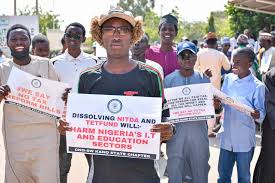The Students’ Wing of the Coalition of Northern Groups (CNG-SW) has voiced strong opposition to the Federal Government’s proposed Tax Reform Bill, warning that it poses a significant threat to education and development in Northern Nigeria.
The protest, held in Abuja on Tuesday, highlighted the perceived adverse effects of the reforms on institutions like the Tertiary Education Trust Fund (TETFund) and the National Information Technology Development Agency (NITDA), which have been pivotal in advancing education and digital innovation.
Speaking at the protest, the National Coordinator of CNG-SW, Hassan Adamu, described the bill as “an existential threat to education in Northern Nigeria.” He argued that the reforms, if implemented, would divert funds from critical sectors, leaving institutions underfunded and students overburdened with debt.
Adamu stated, “The Tax Reform Bill has the potential to cripple essential educational institutions and initiatives. By reducing funding for programs like TETFund and NITDA, we are jeopardizing the future of education and innovation in the North. These agencies have been instrumental in addressing long-standing challenges, and this bill threatens to undo that progress.”
Concerns Over Reduced Coverage
Adamu specifically criticized the bill for narrowing the coverage of the National Education Loan Fund (NELFUND) in the North. He revealed that in states like Zamfara, Sokoto, and Kano, only a handful of public tertiary institutions were covered by the fund. “In Zamfara, only four out of ten public institutions were included. In Sokoto and Kano, it’s the same story,” he said, adding that such limited coverage disproportionately affects students in the region.
Fear of Rising Tuition Fees
The group expressed concerns over the potential misuse of the student loan scheme, predicting that it could lead to a spike in tuition fees. Adamu explained, “Institutions may exploit the scheme to justify fee hikes, pushing education further out of reach for indigent students. The current economic realities make this a catastrophe waiting to happen.”
Adamu warned of a ripple effect, where higher tuition fees and delayed loan refunds could lead to increased dropout rates. He said, “Over 60% of students in Northern institutions already face financial difficulties. This reform will only worsen the situation, creating a generation of indebted youth incapable of contributing meaningfully to the economy.”
Impact on Digital Innovation
The coalition also highlighted the implications for NITDA, which funds digital inclusion and innovation initiatives. Under the proposed reforms, NITDA’s funding would be significantly reduced. “This is a step backward for a country striving to embrace the digital age,” Adamu noted, emphasizing that reduced funding would hamper technological advancements critical for national development.
Call for Action
The group urged the Federal Government to suspend the reform process and initiate broader consultations. They called on northern legislators and governors to study the bill thoroughly and advocate for amendments that protect education and innovation. “We appeal to northern leaders to take a stand and ensure this bill does not become law in its current form,” Adamu said.
Broader Implications
The CNG-SW also condemned any attempt to use the student loan scheme as a justification for privatizing public tertiary institutions. They argued that privatization would make higher education inaccessible to many Nigerians. “Education is a right, not a privilege. Privatizing public institutions will turn them into revenue-generating entities, leaving the masses behind,” Adamu said.
Conclusion
The protest is part of the CNG-SW’s broader efforts to protect the interests of northern students and ensure education remains a national priority. The group vowed to continue its advocacy, calling on all stakeholders to join the fight for accessible and equitable education in Nigeria.
Adamu concluded, “We are not against reforms, but they must be inclusive and equitable. The future of our youth depends on it, and we cannot afford to fail them.”
Related Issues
The coalition’s protest adds to the ongoing debate surrounding the proposed tax reforms, with various stakeholders calling for more transparent and consultative policymaking processes to address the nation’s pressing educational and economic challenges.



















































































 EduTimes Africa, a product of Education Times Africa, is a magazine publication that aims to lend its support to close the yawning gap in Africa's educational development.
EduTimes Africa, a product of Education Times Africa, is a magazine publication that aims to lend its support to close the yawning gap in Africa's educational development.
Thank you very much for reaching out. Kindly forgive this very late response